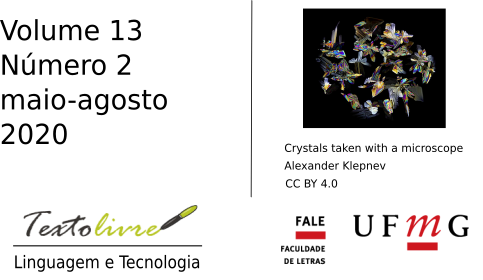Digital teaching competence
guidelines for referential
DOI:
https://doi.org/10.35699/1983-3652.2020.24401Keywords:
Digital skills, Educational references, Teacher educationAbstract
This study analyzes the conceptions of digital teaching competence defended in referentials developed by Portugal (GEPE), Spain (INTEF), France, European Union, UNESCO and International Society for Technology in Education (ISTE). The objectives of this analysis are (i) to characterize the structure of skills presented by the different referentials, (ii) to identify the specificity of the referentials and (iii) to understand their main lines of action. The method used was inductive content analysis, supported by a data collection grid categorized according to the purpose of the study. As results, a comparative analysis is presented categorizing, specifying and identifying the main guidelines for teacher's digital competence. The relevance of the study is in the current context of the society that puts education and the teacher in the spotlight of an emerging agenda that translates into the need for guidelines for the continuing education of teaching professionals to develop digital skills that generate new pedagogical practices. The research can contribute to the scientific knowledge of future public policy projects in countries that wish to develop educational references, or for institutions of initial and continuous teacher education.
Downloads
References
ALMERICH, G., SUÁREZ-RODRÍGUEZ, J., DÍAZ-GARCÍA, I., ORELLANA, N. Estructura de las competencias del siglo XXI en alumnado del ámbito educativo. Factores personales influyentes. Educación XX1, v. 23, n. 1, p. 45-74, 2020. Disponível em: http://revistas.uned.es/index.php/educacionXX1/article/view/23853/20479. Acesso em: 10 jan. 2020.
BACICH, L.; MORAN. J. (org.) Metodologias ativas para uma educação inovadora: uma abordagem téorico-prática. Porto Alegre: Penso, 2018.
BARROS, A. J. S.; LEHFELD, N. A. S. Fundamentos de metodologia científica. 3 ed. São Paulo: Pearson Prentice Hall, 2007.
BESSIÈRES, D. Les TICE au travers du C2i2e: une visée managériale englobante. In: ALEMANNO, S. P. (dir.). Communication organisationnelle, management et numérique. France: Editions l’Harmatan, 2013, p. 111-122.
BESSIÈRES, D. Les enjeux de modernisation des TICE: des genèses d’usages pour des injonctions paradoxales qui se pérennisent avec le C2i2e?. In: XIXème Congrès de la SFSIC – Penser les techniques et les technologies, 2014, Toulon, France. Disponível em: https://halshs.archives-ouvertes.fr/halshs-01557573/document. Acesso em: 10 nov. 2019.
CERVO, A. L.; BERVIAN, P. A.; Da SILVA, R. Metodologia científica. 6. ed. São Paulo: Prentice Hall, 2007.
COMISSÃO EUROPEIA. Recomendação do Conselho de 22 de maio de 2018 sobre as Competências Essenciais para a Aprendizagem ao Longo da Vida. Jornal Oficial da União Europeia, União Europeia, 4 jun. 2018, p. C189/01-C189/13. Disponível em: https://eur-lex.europa.eu/legal-content/PT/TXT/PDF/?uri=CELEX:32018H0604(01)&from=EN. Acesso em: 13 set. 2019.
COSTA, F. (coord.). Competências TIC. Estudo de Implementação. Vol. I. Lisboa: GEPE-Ministério da Educação, 2008. Disponível em: https://repositorio.ul.pt/handle/10451/5928 Acesso em: 10 out. 2019.
DIESEL, A.; BALDEZ, A. L. S.; MARTINS, S. N. Os princípios das metodologias ativas de ensino: uma abordagem teórica. Revista Thema, Pelotas, v. 14, n. 1, p. 268-288, 2017. Disponível em: http://dx.doi.org/10.15536/thema.14.2017.268-288.404. Acesso em: 01 fev. 2020.
ENGESTRÖM, Y. Activity theory and individual and social transformation. In: ENGESTRÖM, Y.; MIETTINEM, R.; PUNAMAKI, R. L. (eds.). Perspectives on activity theory. Cambridge: Cambridge University Press. 1999. p. 19-38.
GIL, A. C. Como elaborar projetos de pesquisa. 5ª. ed. São Paulo: Atlas. 2010.
INTEF. Marco Común de Competencia Digital Docente. out. 2017. Disponível em: https://aprende.intef.es/sites/default/files/2018-05/2017_1020_Marco-Com%C3%BAn-de-Competencia-Digital-Docente.pdf . Acesso em: 20 set. 2019.
ISTE. Standards for Educatores. A Guide for Teachers and Other Professionals. United States of America: Library of Congress Cataloging-in-Publication. 2017. Disponível em: https://www.iste.org/standards/for-educators. Acesso em: 28 nov. 2018.
JOINT RESEARCH CENTRE (JRC) – Science for Policy Report. European Framework for the Digital Competence of Educators: DigCompEdu. Luxembourg: Publications Office of the European Union, 2017. Disponível em: https://ec.europa.eu/jrc/en/digcompedu. Acesso em: 16 nov. 2018
LUCAS, M.; MOREIRA, A. DigCompEdu: quadro europeu de competência digital para educadores. Aveiro: UA, 2018. Disponível em: https://area.dge.mec.pt/download/DigCompEdu_2018.pdf. Acesso em 27 nov. 2018.
MEIRINHOS, M.; OSÓRIO, A. Referenciais de competências digitais para a formação de professores. In: XI Conferência Internacional de TIC na Educação – Challenges. Anais Challenges 2019. Braga: Universidade do Minho. 2019. p. 1001-1016.
MINISTÈRE DE L’EDUCATION NATIONALE ET DE LA JEUNESSE. C2i2e. Certificat informatique et internet de l'enseignement supérieur. Bulletin officiel n. 5 du 3 février 2011. Disponível em https://www.education.gouv.fr/cid54844/esrs1000461a.html. Acesso em: 16 out. 2018.
OECD. Innovating Education and Educating for Innovation: The Power of Digital Technologies and Skills. OECD Publishing: Paris, 2016. Disponível em: http://dx.doi.org/10.1787/9789264265097-en . Acesso em 10 jun. 2019.
SCHLEICHER, A. Desafíos para PISA. Relieve, França, v. 22, n. 1, 2016. Disponível em: http://go.uv.es/rY6ogph. Acesso em: 02 nov. 2019.
UNESCO. ICT Competency framework for teachers. versão 2. Paris: United Nations Educational, Scientific and Cultural Organization, 2011. Disponível em: http://unesdoc.unesco.org/images/0021/002134/213475e.pdf. Acesso em: 14 out. 2018.
VALENTE, J.; ALMEIDA, M. E.; GERALDINI, A. Metodologias ativas: das concepções às práticas em distintos níveis de ensino. Revista Diálogo Educacional, Paraná: Pontifícia Universidade Católica do Paraná, v. 17, n. 52, p. 455-478, 2017. Disponível em: https://periodicos.pucpr.br/index.php/dialogoeducacional/article/view/9900/12386. Acesso em: 14 ago. 2019.
Downloads
Published
How to Cite
Issue
Section
License

This work is licensed under a Creative Commons Attribution 4.0 International License.
This is an open access article that allows unrestricted use, distribution and reproduction in any medium as long as the original article is properly cited.











